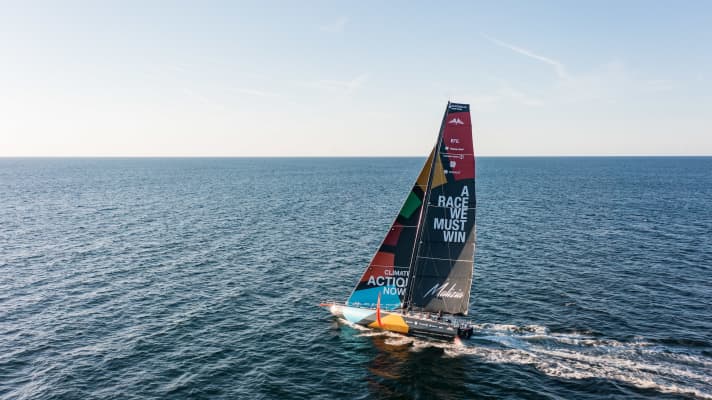
Yesterday, the French sports newspaper "L'Équipe" published a statement by various ocean sailors on behalf of the sustainability organisation "La Vague" (The Wave). The sailors want to put an end to the material battle that prevails in many areas of sailing in favour of greater sustainability. In particular, the high level of greenhouse gas emissions caused by logistics and the construction of new boats urgently needs to be reduced.
According to the signatories, this should be anchored in the rules of the classes and taken into account in the planning of regattas. Over 80 other sailors are already part of the movement and have signed the text. These include names such as Frenchman François Gabart, winner of the Vendée Globe, and French-German Isabelle Joschke, who took part in the last Vendée Globe. They are committed to acting within the framework of the desired changes.
The original statement:
145,000 tonnes of CO₂ equivalent- for a single regatta
"We practise a wonderful sport, but it is unreasonably harmful to the environment and elitist," reads the publication. It was written by French ocean sailors Adrien Hardy, Arthur Le Vaillant and Stanislas Thuret as well as Simon Fellous, a researcher at the French Research Institute for Agriculture, Food and the Environment.
The upcoming Route du Rhum is cited as an example. The regatta releases around 145,000 tonnes of CO₂ equivalent into the atmosphere, but the earth can only cope with two tonnes per person per year. Logistics and transport account for three quarters of the emissions, while the constant construction of new boats is another problem. 36 of the 138 boats are new builds.
The published text is an appeal to everyone associated with the sport of sailing: "Let's work together - sailors, boat builders, race organisers, sponsors, journalists and the public - to reinvent our sport. Let's reinvent the concept of performance."
Ranking according to carbon emissions
The aim is to concretise these approaches and even incorporate sustainability into the regulations. An "eco-rating" or "carbon quotas" are mentioned as suggestions. In this way, the aim is to valorise the performance of sailors on older boats instead of prioritising new builds. In general, it would be desirable to focus more on human performance than on the rapidly developing technology.

With flax fibre for more sustainability
Organisers, such as those of the America's Cup, often argue that the boats must represent the latest state of the art in order for the event to be attractive to spectators and therefore sponsors. French ocean sailor Roland Jourdain, on the other hand, sees no correlation between speed and success with spectators. In an interview with the French sailing medium "Tip & Shaft", he cited the last Vendée Globe as an example. It generated huge enthusiasm, even though no records were broken and by no means only new boats sailed in it.
The two-time winner of the Route du Rhum will be competing in this year's regatta across the Atlantic with a catamaran made of 50 per cent flax fibre. The 58-year-old Frenchman explained that he wanted to promote the spread of this technology, as progress was too slow for him. "It should serve as a proof of concept for those who still doubt or don't realise that a hectare of flax can cross the Atlantic."
He also wants to give the cruising scene food for thought in terms of sustainability: "I'm not convinced that the boats of tomorrow have to be equipped like our houses. Do you need all the comforts on board to be happy at sea?"
This might also interest you:
Fewer flights and transport
In order to reduce distances for boats, sailors and fans, "La Vague" is also in favour of regattas with a return route. Frenchman Stanislas Thuret, Class 40 sailor and signatory, illustrates the current situation on the Route du Rhum as follows: "If just one person comes to greet me on Guadeloupe, their return flight already means two tonnes of carbon."
Not explicitly mentioned, but obviously also included are racing series such as the SailGP or The Ocean Race, which are held in different countries on different continents and for which material, crews and other logistics are transported across the entire globe.

